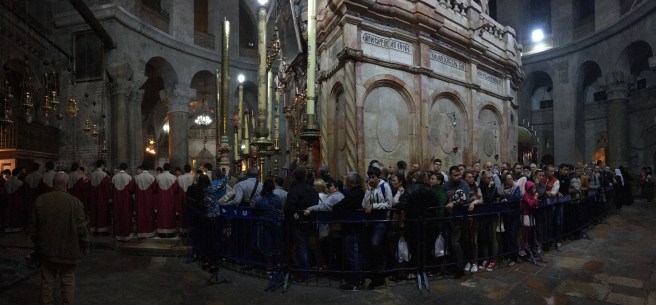The beautiful shepherd Sermon for the Fourth Sunday of Easter 22nd April 2018 at St Francis High Heaton
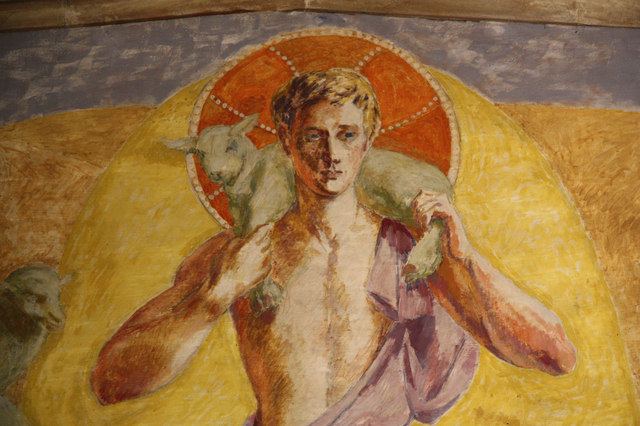
This sermon was preached before the Annual Parochial Church Meeting. You can find it here: Sermon for Easter 4B 22.04.18
Sermon for Easter Day 1st April 2018
Pilgrimage to the Holy Land 16th-26th February 2018
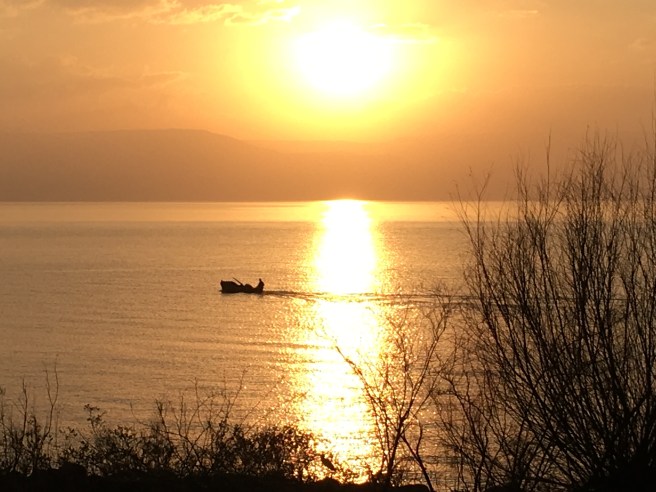
Sunrise over Galilee is a haunting sight as a fisherman sets out to work. We celebrated a communion by the lakeside on Sunday morning and heard the call of the first disciples. Two nights earlier there had been a massive thunder and lightning storm, reminding us how quickly the weather there can change, just like the calm and storm of life. The physical and metaphorical layers of the Holy Land means that there is a constant reappraising of one’s own perspective. Jerome called the land the fifth gospel, and like a biblical text, what one takes from a visit here depends a lot on what one brings to it.
The Dead Sea, taken from the top of the fortress of Masada, stretches in a barren terrain. They have a saying here that one should be like Lake Galilee, giving of one’s self (as the lake’s water flows into the Jordan River), unlike the Dead Sea which only receives water and is therefore lifeless. The Israeli and Jordanian governments have ambitious plans to drain the Dead Sea for all its minerals, and then refill it with desalinated water from the Red Sea, to be brought by giant water pipes from the south, in a massive civil engineering project that would transform the desert into a fertile region. One wonders how they might turn out…. it will certainly make the old adage redundant!
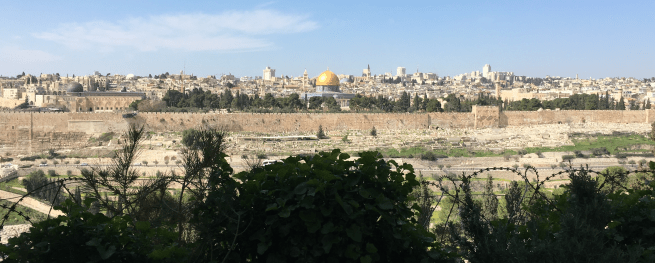
The view of the Old City from dominus flevit never tires…. from this angle the barbed wire hints at the conflict that continues to shape the lives of those who live in and near this place. Tears flow easily at this sight, but I am sure that our resolution should not be simply to pray for the peace of Jerusalem, but also to work for real peace in our own communities, and to press our own governments to follow policies that would bring proper justice and dignity to the peoples of this land. Having said that, just as the cross lies at the heart of our salvation, so the injustice one observes here seems an almost permanent feature of the landscape. Our guide Bishara Smeir commented to me, We walk the Via Dolorosa two hundred times a day.
Sermon in the wake of Charlottesville, preached 20th August 2017
HOLY LAND PILGRIMAGE 16th-26th February 2018
I would like to invite you to join me and The Reverend Gary Birchall on a pilgrimage to the Holy Land in 2018.
You can find a Brochure here: HOLY LAND BROCHURE 2018
Like many Christians before us, we’ve found that pilgrimage has nourished and stimulated our faith in a unique way. We will be going to places you have read and heard about in the Bible. Starting besides the waters of the Sea of Galilee we will visit sites such as Nazareth and Capernaum, others where you will discover intriguing connections with Jesus and faith. Then we will journey south through the hills of Samaria, down to the Jordan valley passing places where John the Baptist worked, visiting Jericho before ascending up through the hills of the Judean desert and over the crest of the hill to Bethlehem, where Jesus was born and where we will spend two nights. We then proceed to Jerusalem and stay within the mediaeval city walls, within walking distance of key places and we will explore the Jerusalem sites of Jesus life and death and resurrection. Inevitably, the hills and landscape are little changed, but the modern towns and cities, and the huge challenges of the contemporary political and religious debates will also be there in front of our eyes. We will learn more of the history of the last hundred years as well, which also has huge impact for many making this pilgrimage. We hope to hear from people committed to work for peace in the present “realities”. We are delighted to say that we will be travelling with Lightline Pilgrimages, a Christian travel company who work exclusively with Christian pilgrim houses, restaurants, and tour guides, and which is the “official and preferred” pilgrimage operator for the Anglican Diocese of Jerusalem. This isn’t the cheapest option, but we believe it’s the most ethical way to travel: not only does it support our Christian brothers and sisters in a very practical way, but also through its partner on the ground, Lightline can open doors to the different communities we will encounter.
To find out more, please email robert.lawrance@newcastle.anglican.org and see below for some images… do join us!
Robert Lawrance
Vicar of St Francis High Heaton
Sermon for Remembrance Sunday 13th November 2016
Homily on Mary Magdalene delivered on 21st July 2016 at the Mothers’ Union Quiet Evening
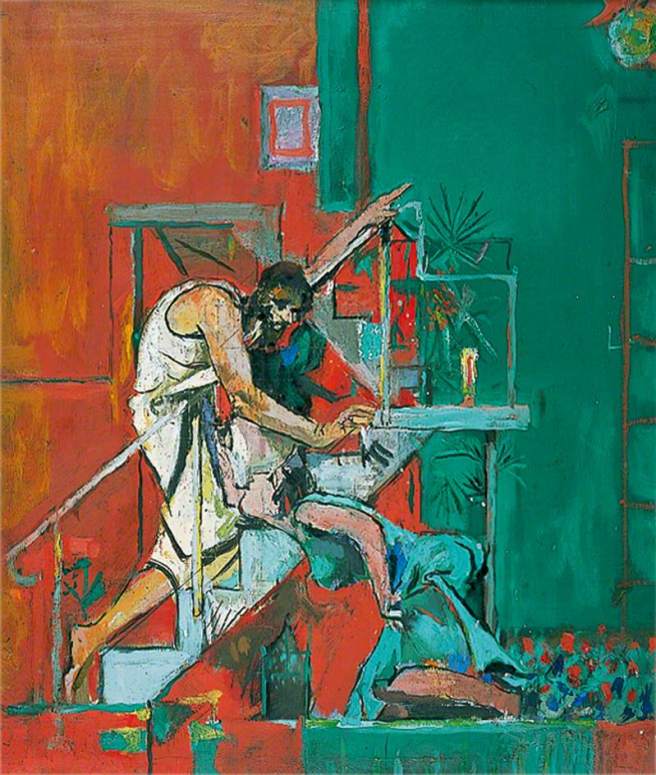
Crib, Cross & Communion; thoughts on Franciscan Spirituality as a tool for parish ministry

Click here to download Crib, Cross & Communion
Public and private faces, a sermon for the Third Sunday after Trinity 12th June 2016, including the Queen’s 90th birthday and the EU referendum!

When Paddington first went to live with the Browns he wasn’t sure how old he was, so they decided to start again at one. They also agreed that bears “just like the queen” have two birthdays every year and they decided that Paddington should celebrate his on Christmas Day and June 25th. Although Paddington always celebrates his birthdays, he never actually gets any older! This year marks his 58th (human) anniversary, since the publication of the very first book on October 13th 1958.
So, the queen, like Paddington Bear has two birthdays, but not because she is a bear, but because she has a private one (her actual date of birth), and a public one in the summer, when we hope the sun will shine for Trooping the Colour and all the fetes and garden parties which are taking place to celebrate.
This tradition reflects what we know to be true about ourselves and all human beings…. for we each have a public persona and an inner face. Those who know us best probably know us in a way that others don’t, but sometimes perhaps we like to reserve to ourselves an inner space that even those who are nearest to us don’t really encounter, and perhaps even that we don’t acknowledge ourselves. If this includes suppression and denial it can be very destructive. Life is a journey of experiences and relationships that shape us, many of them beyond our control or understanding, and part of being human is learning to live with ourselves, and to live well with ourselves so that we can live well with others. This isn’t always easy…. I worked in a parish that held a Christmas lunch for people who would otherwise be on their own. Families made heroic sacrifices, giving up their own family space, cooking, serving and transporting various lonely souls… and a real mixture of characters would be there, often quite angular and obstreperous… and I recall someone wryly observed, “once you’ve spent Christmas with someone who’s usually alone at Christmas you discover why they’re alone at Christmas….”
Some of us manage to keep our public faces and private lives separate, and some of us can’t help revealing all about ourselves… (I once had a boss who observed drily “you can’t hide it when you’re bored, can you?”), and some even try to project a different face, a heroic version of themselves, and some don’t (or can’t) face up to the truth about themselves…
The story of David and Bathsheba is one that sits uncomfortably with the heroic image of David and has the sordid detail of a tabloid story. David falls for the beautiful Bathsheba and arranged for her husband to be placed in the thick of battle so that he will be killed and so that David can then claim her as a wife. This (note to those who look to scripture for biblical authority on marriage), was in addition to a number of other wives and concubines he already had! David’s secret action angers God and he sends Nathan with a parable that has an impact; David is struck with remorse, but the action has consequences… if you read on in the story the child dies, in spite of David’s prayers, and duly chastened, David changes his ways. I don’t believe God chooses the death of any creature, but we can imagine that such a tragic death will feel like a punishment to one who has been neglectful of his true responsibilities. We are shaped by our experiences of relationship, and most of us negotiate this fairly OK, but not everyone does, which is why those who fall into sin (as the prayer book has it) probably deserve our compassion rather than our condemnation. Addiction and addictive behaviour, criminality and other forms of misanthropy have complex causes. For powerful people like David it is perhaps more reprehensible than for those for whom poverty and abuse have been their parental forces. Our society struggles with penal policy, should we aim to punish or rehabilitate criminals… (what does institutional forgiveness look like?) and within that is a deeper question about whether it is ever right to imprison women, and especially the mothers of children, for whom imprisonment seems bound to create just another generation of unloved people who are bound for yet more criminality.
Whatever our personal views on a public policy like prisons, our faith appears to challenge us to think hard about how the private and public spheres relate to each other, and especially in the context of making a moral judgement. The encounter between Jesus and a woman who is a ‘notorious sinner’ is vivid and plain in its meaning: people who appear to be good risk harbouring evil in their hearts, especially when they are quick to make a judgement about a women whose sinfulness is well-known, but who has the insight to recognise her need of grace when she encounters it and to respond in a way that makes herself vulnerable beyond measure.
It is interesting that straight after this story Luke lists the women who accompanied Jesus…
Mary, called Magdalene, Joanna, the wife of Herod’s steward Chuza, and Susanna, and many others, who provided for them out of their resources. We also know of Martha and Mary, the mother of Zebedee, Mary the mother of James and John, Mary his mother, Salome, Mary the wife of Clopas, quite apart from the Samaritan woman, the Syro-Phonecian woman, the woman whom he healed on the Sabbath and called a daughter of Abraham, the widow of Nain, the woman with the issue of blood, the daughter of the synagogue leader… in fact women often feature more prominently than the men, and this represents a subversion of accepted norms, which of course is the nature of grace. Jesus parries the judgements of his hosts with a story about forgiveness, which he casts in economic terms, and even this story makes little sense; what lender of money with any business acumen would release his debtors in such a way? The story gains traction if we consider how much people in our world are more indebted than ever, such that (for example) in the referendum debate personal finance is a more important factor than (say), global development or peace in Europe.
The relationship between debt and forgiveness needs more understanding, not least because it highlights another aspect of sin that we must consider, namely the distinction between personal and public sin. It is easy to spot faults in another person (and hide them in ourselves) but what about our participation in the bigger public sins, such as pollution, over-consumption or military expedience?
In the earthy style of the gospels, the way to read this is in the pitiful action of the weeping woman… the diners would not be seated, but reclining around an open square, the woman’s actions are of the deepest humility. Humility is being honest about ourselves, and the net effect is that it should make us very gentle with each other, and this is both the anchor and mechanism of forgiveness…
A Christian writer called Eugene Peterson wrote “The church is a group of sinners, and what’s more, it’s led by sinners”. I’m not entirely sure how this pans out for how a church community represents itself to a wider community, but a character of humility and forgives, grace and generosity of spirit is probably along the right lines. In terms of our personal discipleship it means being willing to make the inward journey to acknowledge the truth about ourselves, before helping others. Elsewhere in the scripture Jesus points out the tendency to spot faults in others rather than address the faults in ourselves. The inner journey is perhaps the hardest one to make, and yet also the most important. Another time I would like to develop this theme, and perhaps it might form the basis for some further study or discernment as a pattern of discipleship, what it means to be truly Christian, ministering forgiveness in places where there is precious little forgiveness. I have a sense that our society and world need it more than ever, and perhaps on a weekend when the celebration of the queen’s birthday might draw us to consider our civic duty, perhaps this is a message the church can be bolder in preaching as a way of creating a more generous society. And that way of thinking might also help inform us decide how we shall vote in the forthcoming referendum, but that’s a public action for each of us to decide in the privacy of the ballot box!
